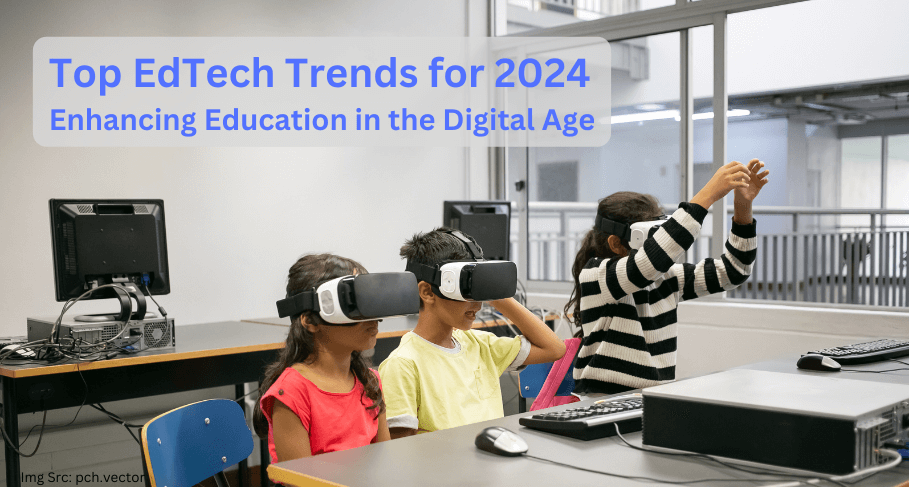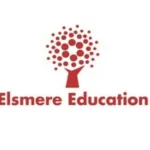We all know that the realm of education is poised for a profound transformation, propelled by the ever-evolving landscape of EdTech. 2024 will be a massive year for education as the digital era keeps changing how we teach and learn because of its cutting-edge tools and approaches. Several major EdTech trends are set to shape education.
Let’s look closely at some of the top trends that will impact education in the coming year.
Top EdTech Trends for 2024: Enhancing Education in the Digital Age
Flexible Learning Environment
Since the onset of the pandemic, a sudden shift to remote learning has propelled the surge in flexible learning opportunities. Educational institutions, schools, universities, and training institutions now offer a diverse array of in-person and remote lessons. Also, the proliferation of cloud technology, video conferencing, and collaborative platforms such as Zoom, Microsoft Teams, Google Meet, Slack, etc., has helped students access education from any corner of the globe.
As mentioned above, the paradigm shift witnessed in hybrid working and learning scenarios allows learners to benefit from remote and in-person – flexible learning environments. This highly flexible transition in learning has driven the adoption of audio-visual technologies, including cameras. Video conferencing kits and versatile tools like charge and sync carts support educators in organizing resources for effective teaching.
Technology Embedded Deeply into Learning Models
Gone are the days when technology was confined to traditional classrooms. Today, classes are introduced with new inventions like augmented and virtual reality, artificial intelligence, and machine learning daily, affecting teachers’ and students’ experiences outside those walls. Integrating technologies like AR, VR, AI, ML, etc., significantly changes learning models like blended learning and flipped classrooms.
Also, STEM education (Science, Technology, Engineering, and Mathematics) fosters early critical thinking and problem-solving abilities.
For example, Amira Learning, an online learning tool designed to improve young readers’ comprehension, uses artificial intelligence (AI) to have pupils read aloud stories so it may evaluate their oral reading fluency and identify areas for development. Amira also offers services to educators and parents, such as student progress reports and dyslexia risk assessments.
Carnegie Learning is another example of how AI and machine learning are used to support students in gaining more profound conceptual knowledge of global languages, mathematics, and English literacy. It uses responsive AI that analyzes a student’s learning style and tailors the curriculum to ensure they grasp the educational concept thoroughly.
More Emphasis on Nano Learning
Nano learning or microlearning is a new learning methodology involving delivering educational content in concise forms such as brief videos, sound bites, short texts, and more. These bite-sized learning resources range from two to ten minutes and are crafted for quick accessibility and comprehension.
In the pursuit of mastering a concept within a tight timeline, nano learning emerges as a catalyst for swift comprehension and targeted focus on the chosen topic. Today’s educators acknowledge the diverse types of learners and their unique needs, emphasizing the strength in crafting materials that align with individual learning styles and contemporary business standards. – Sher Downing, CEO, Downing Edtech Consulting
Various studies claim that the average human attention is only 8 seconds, which may drop in the coming years. So, in such a scenario where humans struggle to remain attentive, nano-learning modules can serve their purposes best. The nano-learning modules are self-contained, concentrating on specific subjects and allowing learners to grasp the concept quickly and easily. Thus leading to a rise in nano learning.
Edutainment
Edutainment, the fusion of education and entertainment, is set to revolutionize learning in 2024. With captivating visuals, intricate narratives, and playful formats, it caters to learners of all ages—whether for career transitions, skill development, or college preparation.
Edutainment breaks the barriers of conventional teaching methods and gives the curious and imaginative minds of students a task to work on. Rather than channelizing their energies outside the classroom, edutainment aims at engaging all their senses within.
For Example, Kahoot! is an interactive online quiz maker and game-based learning platform that uses visual gamification to enhance engagement and completion rates among learners. Learners can use a mobile app or a web browser to access Kahoot.
Also, many educators believe that edutainment materials can engage students differently; they are not dry and dull like traditional learning. Edutainment-based contents have more exciting plot lines, twists and character developments that help keep students’ eyeballs engaged in activities and eventually encourage learning.
Adaptive Assessment
In the evolving education landscape, Student Information Systems and data-driven decision-making have streamlined student evaluation. A one-size-fits-all approach to education no longer applies; on the contrary, knowledge assessment has become dynamic.
As we peer into 2024, the demand for adaptive assessment methods grows. These assessments adjust based on student responses, tailoring the test experience to individual strengths and weaknesses.
Beyond customization, adaptive testing enhances test security by presenting each learner with a distinct set of questions.
Integration of Chatbots
In this highly evolving era, technological advancement and innovations occur daily; education is no exception. One such innovation is the introduction of AI-powered technology, especially Chatbot systems.
It has been found that AI chatbots provide nearly 91% accurate, personalized guidance to students. Chatbots serve as intelligent tutors, tailoring learning experiences to individual students’ needs. Not only this, chatbots analyze responses, adapt study strategies, and help students excel in their studies. These chatbots also support students in their enrollment process by providing required information about the course they want to enrol in, which includes course information, faculties, potential benefits, etc. Besides these, chatbots also help teachers collect and store student data for their use and relieve them of administrative tasks by automating responses to common queries, grading assignments, and analyzing student performance.
For e.g., Boltbot equipped with a knowledge base about the school, makes it an excellent resource for answering questions related to the school’s programs, faculty, and services. Thus, school administrators get to focus more on providing quality education.
As per this report, the Global chatbot market spent 526 million USD in 2021; however, by 2030, it is anticipated to reach USD 3,619 million, expanding at a CAGR of 23.9 per cent from 2022 to 2030.
In education, Chatbots are used to develop students’ interaction skills and assist teaching faculty by bringing automation (Dsouza et al., 2019). It helps increase connectivity, efficiency, and uncertainty in interactions. They can easily provide a focused, personalized, and result-oriented online learning environment (Cunningham-Nelson et al., 2019, pp. 299–306), precisely what today’s educational institutions need.
Skill Development
The process of learning new information and refining current skills in a particular sector is what we call “skill development.” Skill development is essential for developing professionally, maturing psychologically, and staying up to date in a fast-paced environment. It consists of instruction, practice, and staying up to date on knowledge. By developing their skills, people may overcome obstacles, become more proficient, and thrive in various areas of life.
As stated in the newsletter by the World Bank, over 65 per cent of today’s youth will be required to work in jobs that don’t yet exist. Thus, while technology is essential for lifelong learning, skill development is more critical to building abilities that meet the needs of the modern world.
Skill development gives students more self-assurance to participate in joint endeavours and facilitates their acceptance of accountability for their deeds. They gain the ability to make independent judgments and comprehend the potential consequences of their decisions. They also attain independence in handling problems and circumstances. Furthermore, the development of skills aids in the preparation of high school pupils for difficult circumstances in the future.
In conclusion, these top trends for EdTech in 2024 will change the field significantly. These trends, which range from flexible learning environments to nano learning to chatbots and skill development, signal a move toward more individualized and technologically enhanced education. In 2024, learning will be more dynamic, engaging, and customized to meet the changing needs of educators and students.



